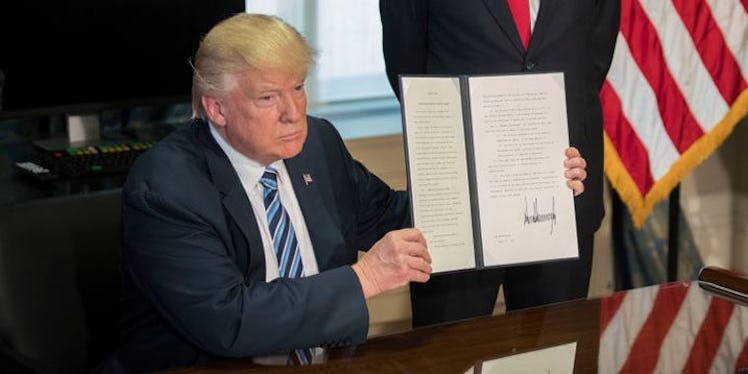
Trump Just Signed A Bill And Immediately Called It "Unconstitutional"
Donald Trump signed a new bill into law on Wednesday, Aug. 2. Immediately afterwards, the president said the law conflicts with the constitution. In a statement issued by the White House, President Trump wrote,
While I favor tough measures to punish and deter aggressive and destabilizing behavior by Iran, North Korea, and Russia, this legislation is significantly flawed. In its haste to pass this legislation, the Congress included a number of clearly unconstitutional provisions.
As the statement mentions, the bill Trump signed was a sanctions bill, officially dubbed the "Countering America's Adversaries Through Sanctions Act." It was meant punish, among other countries, Russia, in part as retaliation for its interference in the presidential election.
The bill was passed in Congress overwhelmingly, by a 98-2 margin in the Senate, and by a 415-3 margin in the House, both of which are regarded as "veto-proof" majorities (because Congress would have more than enough support necessary, i.e. two-thirds of members, to override a Trump veto).
The main gripe claimed within Trump's statement was that the bill stripped the president of certain powers to dictate how Russia is punished, and that is indeed what the law does.
According to the law, Congress has the power to block the president from removing or easing sanctions on Russia. Trump, for his part, implied in the statement that he will push for Congress to not exercise the provision that allows it to block any move the president may want to make in the future.
In other words, both Democrats and Republicans worked together to ensure that Congress had the ultimate say on how Russia was punished, and not the president.
In addition to the official White House statement, Trump threw shade at Congress in a separate statement. Trump said,
Congress could not even negotiate a health care bill after seven years of talking. By limiting the executive's flexibility, this bill makes it harder for the United States to strike good deals for the American people, and will drive China, Russia, and North Korea much closer together.
Clearly, the president is not happy with the bill that congressional Democrats and Republicans came up with together. With that much support, though, Trump's hand was essentially forced to sign it.